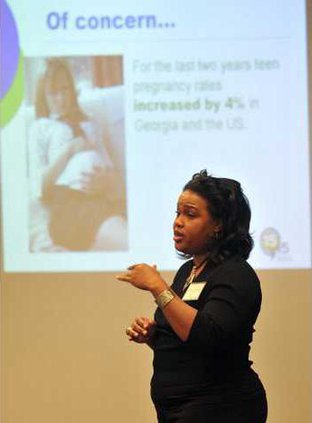Teen pregnancy rates may be decreasing in Georgia, but rates in Hall County continue to be above state averages.
"In 2007, there were 437 teen pregnancies — that’s at least one new pregnant teenager every day," said Mary Parks, Hall County Family Connection coordinator, during a community forum Friday.
"The good news is that the teen pregnancy numbers in Hall County continue to drop, but we are still higher than the state."
According to the latest data provided by Parks, in 2007 there was an average of 78.8 pregnancies in Hall for every 1,000 teenagers. The state average for the same time period and same number of teens was 69.2 per 1,000.
Parks’ presentation was a part of the Teen Pregnancy and School Success Community Forum, sponsored by the Hall County Commission for Children and Families, the Public Health Department District 2, Georgia Campaign for
Adolescent Pregnancy Prevention and Teen Pregnancy Prevention Inc.
During the forum, community advocates pointed out many statistics relating to teen pregnancy and high school graduation rates.
"The good news is that from 1995 to 2005 teen pregnancy rates among girls ages 15 to 19 in Georgia declined by 30 percent; however, for the last two years, teen pregnancy rates increased by 4 percent in Georgia and the U.S.," said Andrea Sharpe, Georgia Campaign for Adolescent Pregnancy Prevention training director.
"Georgia ranks eighth in the country for teen pregnancy and second in the country for repeat teen pregnancy. We also have the fourth highest high school dropout rate."
Because 70 percent of teen mothers never graduate from high school, one way to decrease the dropout rate is keep teens from becoming pregnant and help teen mothers finish high school, Sharpe said.
Teen pregnancies not only affect those involved, they impact the community as a whole.
"Between 1991 and 2004, teen births in Georgia cost taxpayers a total of $5.7 billion. Teen births in Hall County in 2004 alone cost taxpayers a total of $7.9 million," Parks said.
Taxpayer dollars help fund public health care and child welfare services that teen parents often rely on, Parks said.
In order to turn things around, it is important to provide sex education to students that is age-, cultural- and experience-appropriate.
"Research shows that most parents and youth are in favor of sex education. Sex education increases knowledge and awareness, but it does not increase sexual activity," Sharpe said. "Sex education also reduces risk-taking behavior and increases responsible behavior."

